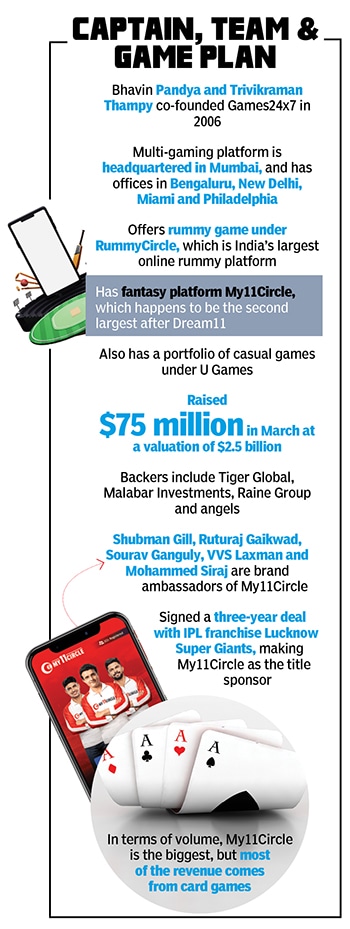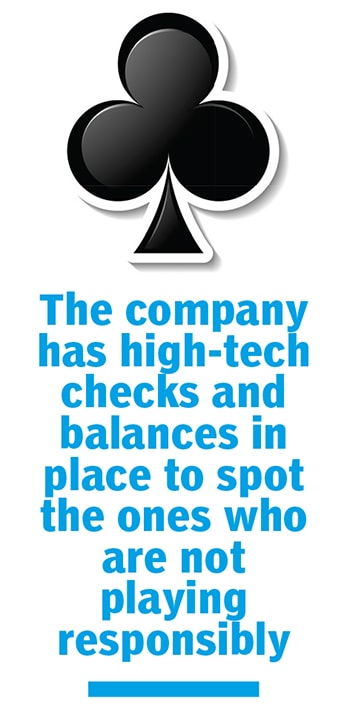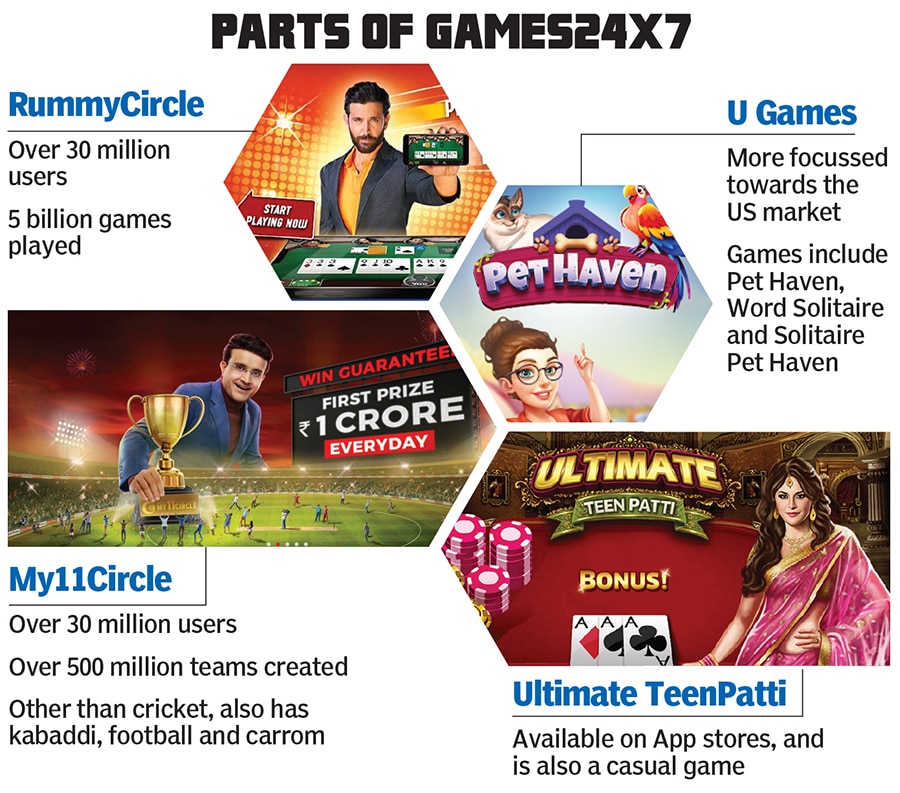Games 24x7: How Bhavin Pandya and Trivikraman Thampy turned wild cards into a wi
In 2006, the two cofounders played their best hand with rummy. The engineer-turned-economist duo, though, tasted success by building a multi-gaming platform, Games 24x7


Rummy," explains RummyCircle on its website, “is a card game that is played with two decks of cards with total of two Jokers." Almost three years after dealing with a bad hand, Bhavin Pandya and Trivikraman Thampy looked like two jokers to bankers. “Are you guys serious? Is this even legal?" asked one of the top honchos of an MNC bank. Sitting across the table, and in the firing line, were two friends who co-founded Games24x7 in 2006. They started with a free online rummy game, chess and a bunch of other casual games, somehow survived the global financial crisis of 2008, and were now rolling out RummyCircle, their first paid online rummy platform.
For Pandya and Thampy, the chips were down. A prerequisite for a paid online game was a payment gateway. Unfortunately, the duo didn’t have any, and were now pleading, and building their case, with banks and companies processing online payments.
“Will this get us in trouble? Nobody offers rummy in an online paid format," retorted another nervous banker who was paranoid about the segment’s lack of regulation. He was justified in his reaction. There was no precedent, there was no clarity on compliances, and the future looked uncertain.
The financers, though, were not the only ones to feel jittery. The co-founders were pariah for advertisers as well. In spite of a slew of court verdicts on the legality of rummy, nobody was willing to punt on the first-time founders. After months of struggle, the games started. CC Avenue came on board, followed by HDFC. “We were the first company to get a payment gateway," says a beaming Pandya on a Zoom call from Boston in May. His friend, who logged in from Miami, flaunts another achievement. “We were the first ones to convince Google and Facebook that this is a legitimate industry that should be able to run ads," claims Thampy.

There was one more super hurdle to cross. Till 2010, the friends ran a tight ship largely on the back of generous angel funding. And since the business was profitable, there was no sense of urgency to actively reach out for institutional funding. But when the duo did decide to scout for funders from 2010 onwards, they ran out of luck. Some venture capitalists (VC) didn’t get the game, some understood but hesitated to take the final leap, and some played the waiting game. After months of denial and rejection, hedge fund biggie Tiger Global backed the gaming venture in 2011.
 There was more drama to unfold. Next year, in 2012, a Madras High Court verdict on an offline rummy club created an existential crisis for Games24x7. Though the judgment didn’t have anything to do with online rummy, Pandya and Thampy were forced to shut operations in Tamil Nadu, a state which was contributing around 25 percent of revenue. Though over the next few months the air was cleared and operations restarted, the founders realised the flip side of putting all their eggs in one basket. “We started diversifying," says Pandya.
There was more drama to unfold. Next year, in 2012, a Madras High Court verdict on an offline rummy club created an existential crisis for Games24x7. Though the judgment didn’t have anything to do with online rummy, Pandya and Thampy were forced to shut operations in Tamil Nadu, a state which was contributing around 25 percent of revenue. Though over the next few months the air was cleared and operations restarted, the founders realised the flip side of putting all their eggs in one basket. “We started diversifying," says Pandya.
Over the next few years, Games24x7 started investing in free-to-play games. It launched Ultimate Teen Patti and Ultimate Rummy on Google Play store. In 2015, it rolled out U Games, the casual gaming studio. The results started to show. In December 2015, Ultimate Teen Patti emerged as the biggest grossing Teen Patti app on the Google Play store. By 2017, over 15 million players were active on the Games24x7 platform. Two years later, the founders rolled out My1Circle, a fantasy sports vertical, and roped in Sourav Ganguly as the brand ambassador. There has been no looking back since then.
Fast forward to 2022. Games24x7 raised $75 million from a clutch of investors such as Malabar Investments, Tiger Global, Raine Group and angels at a valuation of $2.5 billion. The unicorn has been galloping at a furious pace in terms of revenue and profit as well. For FY21, it posted a revenue of ₹1,573 crore and profit of ₹110 crore. The co-founders declined to share the financials for FY22.
The backers are delighted with the progress. “Games24x7 is a pioneer in the fast-growing online gaming industry in India," contends Sumeet Nagar, managing director at Malabar Investments. The company, he lets on, has built a highly profitable business with outstanding acquisition and retention metrics. “In fact, they have continuously improved on all metrics at a great scale, which is quite a remarkable feat."
John Salter, partner and co-founder at Raine Group, too, is bullish about the online gaming company. “We are strong believers in the potential of India’s gaming market," he says. Games24x7, he reckons, continues to drive innovation as a leader in the online gaming industry, delivering immersive game-playing experiences across categories and formats. “We are excited to partner on its growth journey."
The beginning, indeed, was exciting for the friends.

 Pandya, meanwhile, was hooked to Mahjong, a popular Chinese game played with sets of tiles. “That’s how we bumped into each other," recalls Pandya, an electrical and computer engineering grad from Purdue University, who completed his master’s in economics from NYU and was pursuing his PhD in 2005. What brought the two together was their common love of games, and disillusionment with the academic part of the subject in PhD. “It was too much theory and less connect with the real world," says Thampy, who was experiencing a déjà vu moment. During his second year at IIT-Bombay, the young lad realised engineering could never be his love. “Playing games was an easy escape," he says.
Pandya, meanwhile, was hooked to Mahjong, a popular Chinese game played with sets of tiles. “That’s how we bumped into each other," recalls Pandya, an electrical and computer engineering grad from Purdue University, who completed his master’s in economics from NYU and was pursuing his PhD in 2005. What brought the two together was their common love of games, and disillusionment with the academic part of the subject in PhD. “It was too much theory and less connect with the real world," says Thampy, who was experiencing a déjà vu moment. During his second year at IIT-Bombay, the young lad realised engineering could never be his love. “Playing games was an easy escape," he says.
Back at NYU, economics seemed to have swapped places with engineering. Thampy, however, was not alone in losing interest in studies. Pandya, too, was fast turning into a rebel student. Classic Windows games such as Minesweeper, Solitaire, FreeCell and Hearts started making more sense than economics. There was an instant meeting of minds, and both became close friends.
Egged on by the new adrenaline rush, the friends decided to turn entrepreneurs. Pandya was quick to exhibit his appetite for risk. The student, who had spent some time as an engineering intern at GE Medical Systems in their X-Ray and CT modalities earlier, quit his PhD course. “I dropped out of the fully-funded PhD programme in early 2006," he recounts. Pandya came back to India and started Games24x7 along with Thampy. What set the engine moving was $50,000 pumped in by an angel investor in the US. “At that time, the amount seemed like the world to us," Pandya says with a smile. “We felt as if we had achieved everything," chips in Thampy.
With a triumphant feeling, the rookie founders made their entrepreneurial debut.
The friends started with rummy and chess. Both the games were popular, competitive, and were offered for free. If the idea was to build a community and let people come and enjoy the game, then it turned out to be a terrible idea. “We would struggle to find even eight players for a tournament," recalls Pandya, who would religiously pick up his phone half an hour before the match, make frantic calls to over two dozen friends and plead with them to come online to play. His plight was understandable. “There were cash prizes to be won, and we struggled to find players," he rues.
If the card game gave a tough time to begin with, chess displayed its magnetic appeal by attracting an army of players. But that was the problem. The participants started using computers, and cheating became rampant. “We had to pull chess down fairly early into our journey," says Thampy. The friends continued with rummy. But there were two big problems awaiting them. First, a rickety internet infrastructure in the country hampered a seamless gaming experience for the users. Second, the card games, including rummy, had a negative perception. Though the friends kept the game free during the first few years, they had to battle hard to make people realise that the game is predominantly based on skill. A bunch of court verdicts, dating back to the 1960s and later decades, were not of much help.

With no signs of monetisation during the early months, the dice were getting heavily loaded against Games24x7. “We thought with $50,000, we could do anything," says Pandya. Interestingly, it took only over half-a-dozen months to realise that $50,000 doesn’t last too long. Another angel investor cut a small cheque. But this time the small amount—the duo decline to disclose how much—looked like a mountain of money. Reason: Over the next few months, the global recession came knocking in 2007, and it became acute in 2008. Again angels chipped in and the friends managed to tide over the crisis. In fact, till the first institutional funding in 2011, angels had put in over $1.5 million.
A decade later, the friends have managed to live a part of their vision. “We want to build an entertainment business," says Pandya. While RummyCircle has emerged as India’s largest online rummy platform, My11Circle has become the second-largest fantasy player after Dream11. In spite of the massive reach, the co-founders know that there are challenges galore.
One of the challenges emerges from the gaming ecosystem itself. Pandya explains. Over the last few years, he lets on, a lot of operators who are not running games of skill have managed to get payment gateways. “It might become a bit like the Wild West, which could hurt the industry," he says. The company, he contends, has been trying to educate the stakeholders in the ecosystem.
Another challenge is the alleged taint of gambling associated with fantasy sports. Pandya, for his part, is proactive in raising the red flag. “It is no longer entertainment if you know you’re spending 14 hours a day playing," he says. “If it becomes something else, we don’t want that," he says, adding that he wants to entertain people in a healthy and sustainable way.
The company, he claims, has high-tech checks and balances in place to spot the ones who are not playing responsibly. The players, Thampy underlines, who are not playing responsibly, tend to display a certain pattern. “So if you lose a couple of games, then you will keep raising stakes to make back the lost money," he says. This gives a warning sign to the platform.
First Published: Jun 10, 2022, 13:03
Subscribe Now